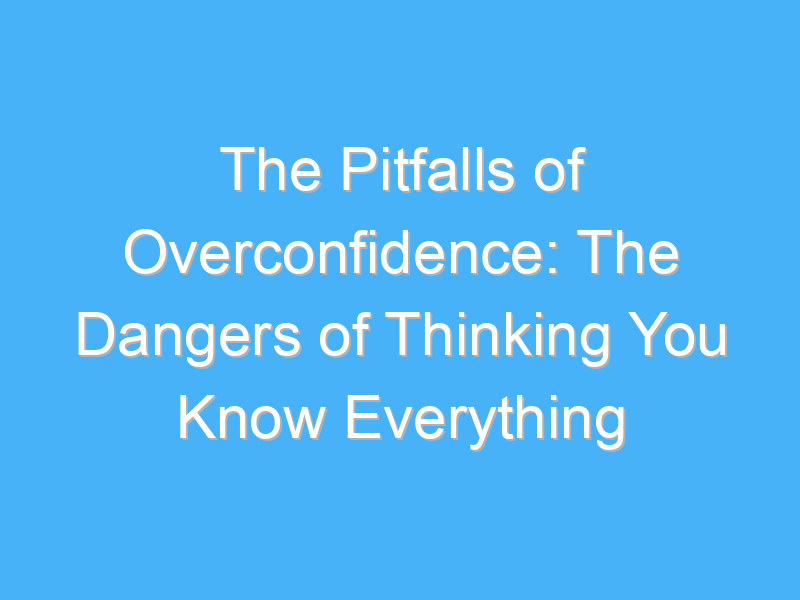
The Pitfalls of Overconfidence: The Dangers of Thinking You Know Everything
Have you ever encountered someone who believes they know everything but in reality, they do not? This type of individual can be quite frustrating to deal with. But what is the appropriate term for such a person? In this discussion, we will explore and attempt to define the term for someone who thinks they know everything but doesn’t actually.
The Dunning-Kruger Effect: The Science Behind Overconfidence
The Curse of Ignorance: How People Fall Into the Trap of Overconfidence
Understanding the Dunning-Kruger effect is vital when discussing the overconfident individual. Essentially, this cognitive bias states that those who are least skilled in a particular area are often the most confident in their abilities. In contrast, those who are highly skilled in the same area tend to underestimate their abilities. This bias stems from a lack of self-awareness and an inability to recognize one’s own limitations. When it comes to the overconfident individual, they fall prey to the curse of ignorance, convinced that they know everything and therefore unable to see the gaps in their knowledge.
The Perils of Overconfidence: The Damage Done by Those Who Think They Know Everything
Overconfidence can be incredibly damaging, both to the individual and to those around them. In the workplace, an overconfident employee may make poor decisions, refuse to listen to feedback, and create a toxic work environment. In social situations, overconfident individuals may alienate those around them, coming across as arrogant, dismissive, or even cruel. The perils of overconfidence extend beyond the individual, with global consequences. The 2008 financial crisis, for example, was in part caused by overconfident financial professionals who believed they had a complete understanding of the market.
The Roots of Overconfidence: Why We Think We Know Everything
The Illusion of Control: Why We Believe We Can Predict Outcomes
The illusion of control is a cognitive bias that leads us to believe we have more control over outcomes than we actually do. This bias is often seen in gamblers, who believe they can control the outcome of games through their actions. In the overconfident individual, this bias manifests as the belief that they can control outcomes through their own actions, despite evidence to the contrary. This bias can be particularly problematic in decision-making, leading to poor choices and risky behavior.
The Confirmation Bias: Why We Seek Out Information That Supports Our Views
The confirmation bias is another cognitive bias that plays a role in overconfidence. This bias leads us to seek out information that confirms our beliefs while ignoring evidence that contradicts them. In the overconfident individual, this bias can manifest as a refusal to consider alternative viewpoints or evidence that challenges their beliefs. This leads to a closed-mindedness that can be damaging both to the individual and to those around them.
The Road to Recovery: Overcoming Overconfidence
The Importance of Self-Awareness: Recognizing Your Own Limitations
Self-awareness is key to overcoming overconfidence. By recognizing your own limitations and acknowledging the areas where you are lacking knowledge or experience, you can begin to address the gaps in your understanding. This requires a willingness to admit when you are wrong and a commitment to lifelong learning.
The Power of Feedback: Listening to Others and Learning from Criticism
Feedback is also essential in overcoming overconfidence. By actively seeking out feedback from others and listening to criticism, you can begin to understand the areas where you need to improve. This requires a willingness to accept feedback and a commitment to making changes based on that feedback.
The Value of Humility: Embracing the Unknown and Learning from Others
Finally, embracing humility is crucial in overcoming overconfidence. By accepting that there is always more to learn and that others may have knowledge or experience that you lack, you can open yourself up to new ideas and ways of thinking. This requires a willingness to admit when you don’t know something and a commitment to learning from others.
FAQs for “What do you call a person who thinks they know everything but doesn’t?”
What is the term for someone who thinks they know everything but doesn’t?
The term for someone who thinks they know everything but doesn‘t is “know-it-all” or “egotist.” A know-it-all is someone who constantly interjects their opinions, even when they are not relevant or accurate. They may also refuse to listen to others’ ideas or perspectives, as they believe their own knowledge is superior.
Is being a know-it-all a negative trait?
Yes, being a know-it-all is generally considered a negative trait. It can be frustrating and annoying to be around someone who constantly tries to prove their knowledge and belittles others. It can also hinder relationships and collaborations, as this behavior can come across as arrogant and difficult to work with.
Why do some people become know-it-alls?
There are several reasons why someone may become a know-it-all. One reason may be insecurity, as they feel a need to prove themselves to others. Another reason may be a lack of self-awareness, as they do not recognize that their behavior is alienating. Additionally, some people may have had experiences in the past where their opinions were dismissed or invalidated, leading them to believe that they must always be right.
How can I deal with a know-it-all?
Dealing with a know-it-all can be a challenge, but there are a few strategies that can be helpful. One approach is to simply ignore their behavior and not engage in arguments or debates with them. Another approach is to gently suggest that their behavior is not helpful or that others may have relevant perspectives to share. It is also important to set boundaries and not allow a know-it-all to dominate conversations or dismiss others’ ideas.
